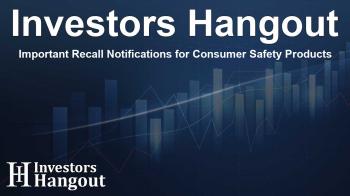Important Recall Notifications for Consumer Safety Products

Recent Product Safety Recalls and Their Implications
In a significant announcement, the Consumer Product Safety Commission (CPSC) has reported several crucial safety recalls. These recalls are essential for the well-being of consumers and aim to eliminate potential hazards associated with various consumer products.
Duluth Trading Company’s Children's Pajama Set Recall
One of the notable recalls involves Duluth Trading Company, which has recalled children's holiday pajama sets due to a serious burn hazard. These products failed to meet federal flammability regulations for children's sleepwear. Parents are urged to take immediate action if they own these sets, ensuring their children’s safety by discontinuing use.
Details of the Recall
These pajama sets, exclusively sold by Duluth Trading Company, pose a risk that every parent should consider. It's important to check if your purchase falls under this recall.
NQDTPBOR Helmets and Safety Concerns
Another serious recall involves NQDTPBOR helmets, which have been found to carry a risk of head injury. These helmets are being recalled after it was discovered that they did not comply with federal regulations established for bicycle helmets, leading to potential safety risks for consumers.
What to Do if You Own a NQDTPBOR Helmet
If you have purchased these helmets, it is crucial to discontinue their use and follow the instruction provided by the CPSC regarding returns or exchanges.
GiantMouse Knives: Laceration Hazards Identified
Furthermore, GiantMouse is recalling its GM12 and GMP12 folding knives due to a laceration hazard. If you own either of these models, it’s essential to refrain from using them. The CPSC has provided guidelines on how to return these potentially dangerous items.
Understanding the Danger
Laceration hazards can often lead to serious injuries, so consumers should prioritize their safety by checking their kitchen and tool supplies for these recalled items.
Window Shades by ChrisDowa and Strangulation Risks
ChrisDowa has also issued a recall for roller window shades that pose strangulation and entanglement risks. Violating federal regulations for window coverings, this recall is particularly focused on protecting children from these hidden dangers.
Safety Measures for Families
Parents should ensure the safety of their children by checking for any involvement of these shades in their homes. Immediate corrective actions should be taken by returning the affected shades.
Celebrity Endorsements and Consumer Products
The safety recalls come at a time when the influence of celebrity endorsements in product sales is significant. Consumers are more likely to purchase products endorsed by beloved figures, resulting in greater scrutiny of such products' safety features.
Therefore, it’s vital for consumers to remain vigilant and stay informed about any recalls or safety issues, even with highly marketed products.
Understanding the Role of the CPSC
The U.S. Consumer Product Safety Commission plays a pivotal role in consumer safety. Charged with the responsibility of protecting the public from unreasonable risks of injury or death associated with consumer products, they oversee thousands of products, ensuring ongoing safety standards and regulations are met.
The Financial Impact of Consumer Product Incidents
It is alarming to note that consumer product-related incidents accumulate costs exceeding $1 trillion annually due to associated deaths, injuries, and property damage. Awareness and responsiveness to recalls are crucial in mitigating these outcomes.
How to Stay Informed
Consumers should stay engaged with CPSC announcements to keep informed of any risks related to the products they use daily. Various resources exist to aid consumers in receiving prompt information.
Recommendations for Consumers
Engaging with the CPSC through their website allows consumers to sign up for email alerts, ensuring they receive immediate notifications about product recalls and safety warnings.
Frequently Asked Questions
What types of products are commonly recalled?
Products that fail to meet safety regulations, such as children's clothing, helmets, knives, and window coverings, are commonly subject to recalls.
How can I check if my product is recalled?
You can visit the CPSC website, which provides up-to-date information on all current recalls and guidelines on how to return affected products.
What should I do if I own a recalled product?
If you own a recalled product, you should stop using it immediately and follow the manufacturer's instructions for returning or disposing of it safely.
Why are these recalls necessary?
Recalls serve to prevent injuries or fatalities associated with unsafe products and to ensure adherence to federal safety standards.
How does the CPSC notify consumers about recalls?
The CPSC notifies consumers through their website, press releases, and media coverage, ensuring widespread awareness of product recalls and safety hazards.
About The Author
Contact Dylan Bailey privately here. Or send an email with ATTN: Dylan Bailey as the subject to contact@investorshangout.com.
About Investors Hangout
Investors Hangout is a leading online stock forum for financial discussion and learning, offering a wide range of free tools and resources. It draws in traders of all levels, who exchange market knowledge, investigate trading tactics, and keep an eye on industry developments in real time. Featuring financial articles, stock message boards, quotes, charts, company profiles, and live news updates. Through cooperative learning and a wealth of informational resources, it helps users from novices creating their first portfolios to experts honing their techniques. Join Investors Hangout today: https://investorshangout.com/
The content of this article is based on factual, publicly available information and does not represent legal, financial, or investment advice. Investors Hangout does not offer financial advice, and the author is not a licensed financial advisor. Consult a qualified advisor before making any financial or investment decisions based on this article. This article should not be considered advice to purchase, sell, or hold any securities or other investments. If any of the material provided here is inaccurate, please contact us for corrections.

